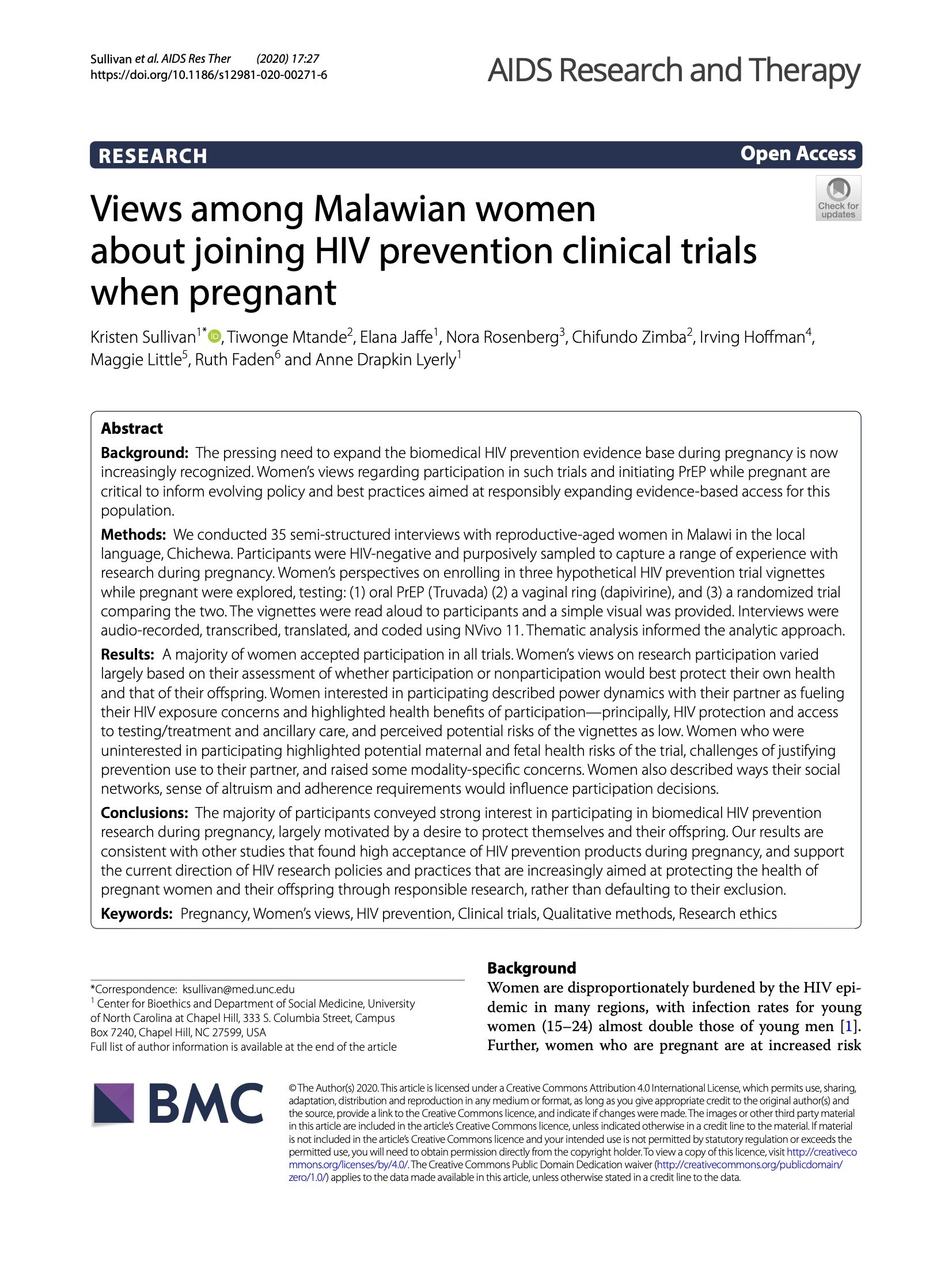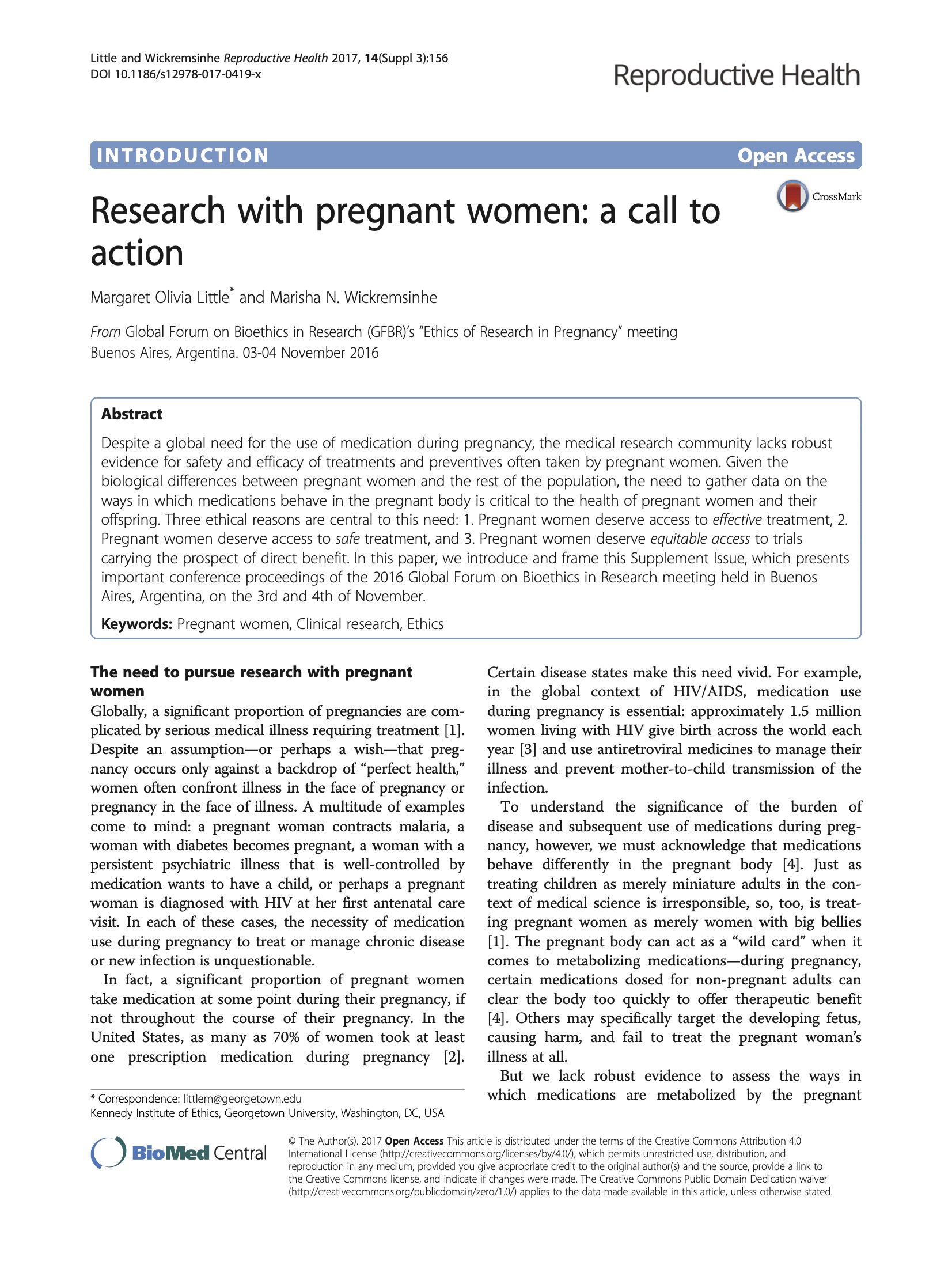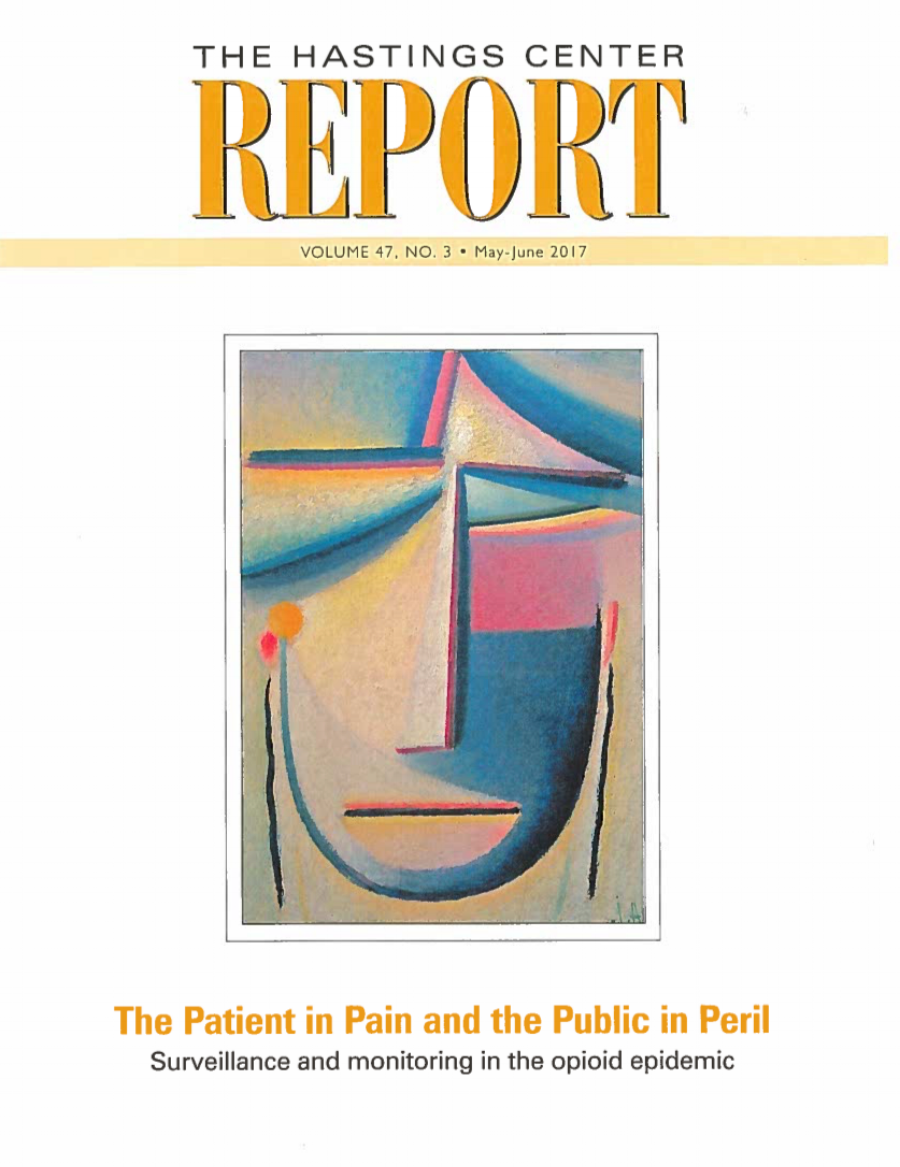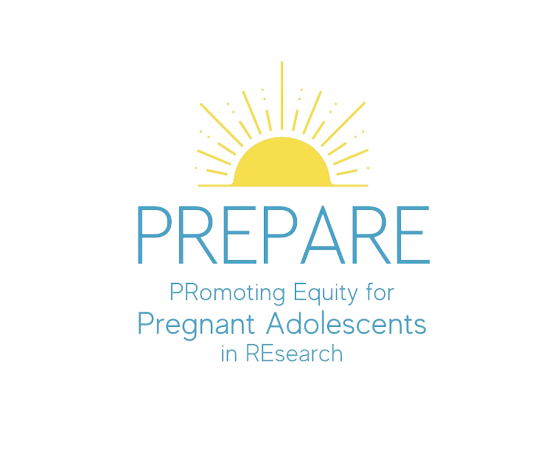Publications from the PHASES grant team
As part of our work to develop ethics guidance for the responsible and ethical inclusion of pregnant women in the HIV research agenda, we publish papers and author book chapters describing our intermediary findings and processes.
Ending the evidence gap for pregnancy, HIV and co-infections: ethics guidance from the PHASES project
A.D. Lyerly et al. 2021. Journal of the International AIDS Society.
“While pregnant people have been an important focus for HIV research, critical evidence gaps remain regarding prevention, co-infection, and safety and efficacy of new antiretroviral therapies in pregnancy. Such gaps can result in harm: without safety data, drugs used may carry unacceptable risks to the foetus or pregnant person; without pregnancy-specific dosing data, pregnant people face risks of both toxicity and undertreatment; and delays in gathering evidence can limit access to beneficial next-generation drugs. Despite recognition of the need, numerous barriers and ethical complexities have limited progress. We describe the process, ethical foundations, recommendations and applications of guidance for advancing responsible inclusion of pregnant people in HIV/co-infections research.”
Views among Malawian women about joining HIV prevention clinical trials when pregnant
KA Sullivan et al. 2020 AIDS Research and Therapy
The pressing need to expand the biomedical HIV prevention evidence base during pregnancy is now increasingly recognized. Women’s views regarding participation in such trials and initiating PrEP while pregnant are critical to inform evolving policy and best practices aimed at responsibly expanding evidence-based access for this population. The majority of participants conveyed strong interest in participating in biomedical HIV prevention research during pregnancy, largely motivated by a desire to protect themselves and their offspring. Our results are consistent with other studies that found high acceptance of HIV prevention products during pregnancy, and support the current direction of HIV research policies and practices that are increasingly aimed at protecting the health of pregnant women and their offspring through responsible research, rather than defaulting to their exclusion.
Research with pregnant women: a feminist challenge.
Little MO et al. 2019. Ethical Issues in Women's Health Care: Practice and Policy. (Eds. D’Agincourt-Canning, Ells, C)
In this paper, we articulate three models that have been advanced for morally framing research with pregnant women: an unfettered protectionist model, in which pregnant women are categorized as a “vulnerable population” for purposes of clinical research; a model of unrestricted deference to the pregnant woman’s autonomy; and a model that construes the fetus as a pediatric research subject. Each, we argue, is critically flawed. As in other arenas in life, pregnancy presents a specific context that deserves a theory of its own. With lessons learned from their respective limitations, we point toward ways in which research during pregnancy must be given unique consideration, and toward progressive work beginning development of an adequate model.
Women’s views about contraception requirements for biomedical research participation
KA Sullivan et al. 2019. PLOS One.
“We conducted 140 interviews, 70 in the U.S. and 70 in Malawi, with women either living with or at-risk for HIV, exploring their views about the practice of requiring contraception in clinical trials. A majority of women interviewed from both countries indicated overall support for the practice, with seven themes characterizing advantages and disadvantages raised: reproductive control, health effects, prevention of fetal harm, burden on women, deferral to authority, autonomy regarding enrollment and birth control method, and relationship concerns. Given the potential benefits and burdens highlighted, contraception in research should be sensitive to actual fetal risk assessments; directed where justified at optimizing effective pregnancy prevention; responsive to women’s reproductive preferences; and made available as an ancillary benefit even where risk thresholds do not justify requirement–in order to facilitate trials that are both ethical and robustly oriented around the interests and lives of women who will participate in them.”
Beyond "vessels and vectors": A Global review of registered hiv-related clinical trials with pregnant women
MN Wickremsinhe et al. 2018. Journal of Women's Health.
"We employed a keyword search of the International Clinical Trials Registry Platform to identify interventional HIV-related trials conducted with pregnant women between January 2001 and December 2015. In total, 63 trials studying use of a pharmacological compound during pregnancy were conducted across 35 countries and sponsored by 74 unique organizations, including pharmaceutical companies. Our findings demonstrate that trials with pregnant women are conducted across a range of countries and sponsors, and much progress has been made to better address pregnant women's own health needs in HIV research. However, our findings confirm other concerns, for example, lack of HIV preventives studied and the lag between medication licensure and study during pregnancy."
Women’s Views About a Paternal Consent Requirement for Biomedical Research in Pregnancy
KA Sullivan et al. 2018. Journal of Empirical Research on Human Research Ethics.
"We conducted in-depth interviews with 140 pregnant women living with or at risk of HIV—70 in Malawi, 70 in the United States—exploring their views on requiring paternal consent for pregnant women’s participation in trials offering the prospect of direct benefit solely to the fetus. The majority of women supported such a requirement; others raised concerns. A trio of themes—the father’s or pregnant woman’s rights, fetal protection, and gender/relationship dynamics—characterized views both supporting and against a paternal consent requirement, expanding the range of considerations that should inform approaches to paternal involvement in research with pregnant women."
Ethics and Research with Pregnant Women: Lessons from HIV/AIDS
MO Little, et al. 2017. Clinical Research Involving Pregnant Women (eds. Baylis and Ballantyne).
"In this chapter, we describe two key lessons about research in pregnancy from the context of HIV/AIDS: first, why addressing the health needs of pregnant women, not just the needs of their offspring, is so critical; and second, why doing so is immediately possible, even as we work to resolve certain ethical and regulatory debates, particularly about when it is appropriate to impose foetal risk without the prospect of foetal benefit. In particular, the HIV/AIDS context shows how treatment or prevention of maternal disease often entails not just risk – but the prospect of benefit – to the foetus; and creative trial designs can advance no-benefit studies without imposing foetal risk in the first place. For all the challenges that research with pregnant women entails, the HIV/AIDS context reveals that it is possible to conduct a wide range of important research during pregnancy that is both ethically responsible and consonant with US regulations."
Research with pregnant women: a call to action
Little, MO and Wickremsinhe, MN. 2017. Reproductive Health.
“Despite a global need for the use of medication during pregnancy, the medical research community lacks robust evidence for safety and efficacy of treatments and preventives often taken by pregnant women. Given the biological differences between pregnant women and the rest of the population, the need to gather data on the ways in which medications behave in the pregnant body is critical to the health of pregnant women and their offspring. Three ethical reasons are central to this need: 1. Pregnant women deserve access to effective treatment, 2. Pregnant women deserve access to safe treatment, and 3. Pregnant women deserve equitable access to trials carrying the prospect of direct benefit. In this paper, we introduce and frame this Supplement Issue, which presents important conference proceedings of the 2016 Global Forum on Bioethics in Research meeting held in Buenos Aires, Argentina, on the 3rd and 4th of November.”
Research with Pregnant Women: New Insights on Legal Decision-Making
AC Mastroianni et al. 2017. Hastings Center Report.
"U.S. researchers and scholars often point to two legal factors as significant obstacles to the inclusion of pregnant women in clinical research: the Department of Health and Human Services’ regulatory limitations specific to pregnant women's research participation and the fear of liability for potential harm to children born following a pregnant woman's research participation. This article offers a more nuanced view of the potential legal complexities that can impede research with pregnant women than has previously been reflected in the literature. It reveals new insights into the role of legal professionals throughout the research pathway, from product conception to market, and it highlights a variety of legal factors influencing decision-making that may slow or halt research involving pregnant women.
Ethical considerations in developing an evidence base for pre-exposure prophylaxis in pregnant women
KA Sullivan and AD Lyerly. 2017. BMC Reproductive Health.
"Though many women in need of access to HIV preventive regimes are pregnant, there is a dearth of data to guide these care decisions. While oral pre-exposure prophylaxis (PrEP) has been shown to prevent HIV infection in numerous high-risk populations, pregnant women have been excluded from all major prospective trials. We propose for ethical examination a theoretical trial—a prospective, observational study of PrEP for pregnant women at risk for HIV in sub-Saharan Africa—highlighting an ethical tradeoff that characterizes issues faced for advancing research in pregnancy... While an observational cohort is potentially the most ethically and scientifically justified research design to study PrEP in pregnancy, earlier involvement of pregnant women in studies of newer preventives may lead to evidence that is more timely and robust."
Advancing HIV Research with pregnant women: navigating challenges and opportunities
CB Krubiner, et al. 2016. AIDS.
"Concerns about including pregnant women in research have led to a dearth of evidence to guide safe and effective treatment and prevention of HIV in pregnancy. We conducted a series of group and one-on-one consultations with 62 HIV investigators and clinicians to elicit their views and experiences conducting HIV research involving pregnant women. Challenges to conducting research on pregnancy and HIV included ethical concerns, legal concerns, financial and professional disincentives, and analytical and logistical complexities. Advancing such research will require clearer guidance regarding ethical and legal uncertainties; incentives that encourage rather than discourage investigators to undertake such research; and a commitment to earlier development of safety and efficacy data through creative trial designs."












